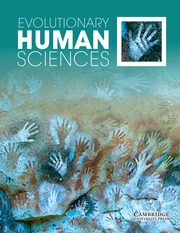No CrossRef data available.
Article contents
Kin selection as a modulator of human handedness: sex-specific, parental and parent-of-origin effects
Published online by Cambridge University Press: 27 August 2024
Abstract
The frequency of left-handedness in humans is ∼10% worldwide and slightly higher in males than females. Twin and family studies estimate the heritability of human handedness at around 25%. The low but substantial frequency of left-handedness has been suggested to imply negative frequency-dependent selection, e.g. owing to a “surprise” advantage of left-handers in combat against opponents more used to fighting right-handers. Because such game-theoretic hypotheses involve social interaction, here, we perform an analysis of the evolution of handedness based on kin-selection, which is understood to play a major role in the evolution of social behaviour generally. We show that: (1) relatedness modulates the balance of right-handedness versus left-handedness, according to whether left-handedness is marginally selfish versus marginally altruistic; (2) sex differences in relatedness to social partners may drive sex differences in handedness; (3) differential relatedness of parents and offspring may generate parent-offspring conflict and sexual conflict leading to the evolution of maternal and paternal genetic effects in relation to handedness; and (4) differential relatedness of maternal-origin versus paternal-origin genes may generate intragenomic conflict leading to the evolution of parent-of-origin-specific gene effects—such as “genomic imprinting”—and associated maladaptation.
- Type
- Research Article
- Information
- Creative Commons
- This is an Open Access article, distributed under the terms of the Creative Commons Attribution-NonCommercial-NoDerivatives licence (http://creativecommons.org/licenses/by-nc-nd/4.0/), which permits non-commercial re-use, distribution, and reproduction in any medium, provided the original work is unaltered and is properly cited. The written permission of Cambridge University Press must be obtained for commercial re-use or in order to create a derivative work.
- Copyright
- Copyright © The Author(s), 2024. Published by Cambridge University Press




